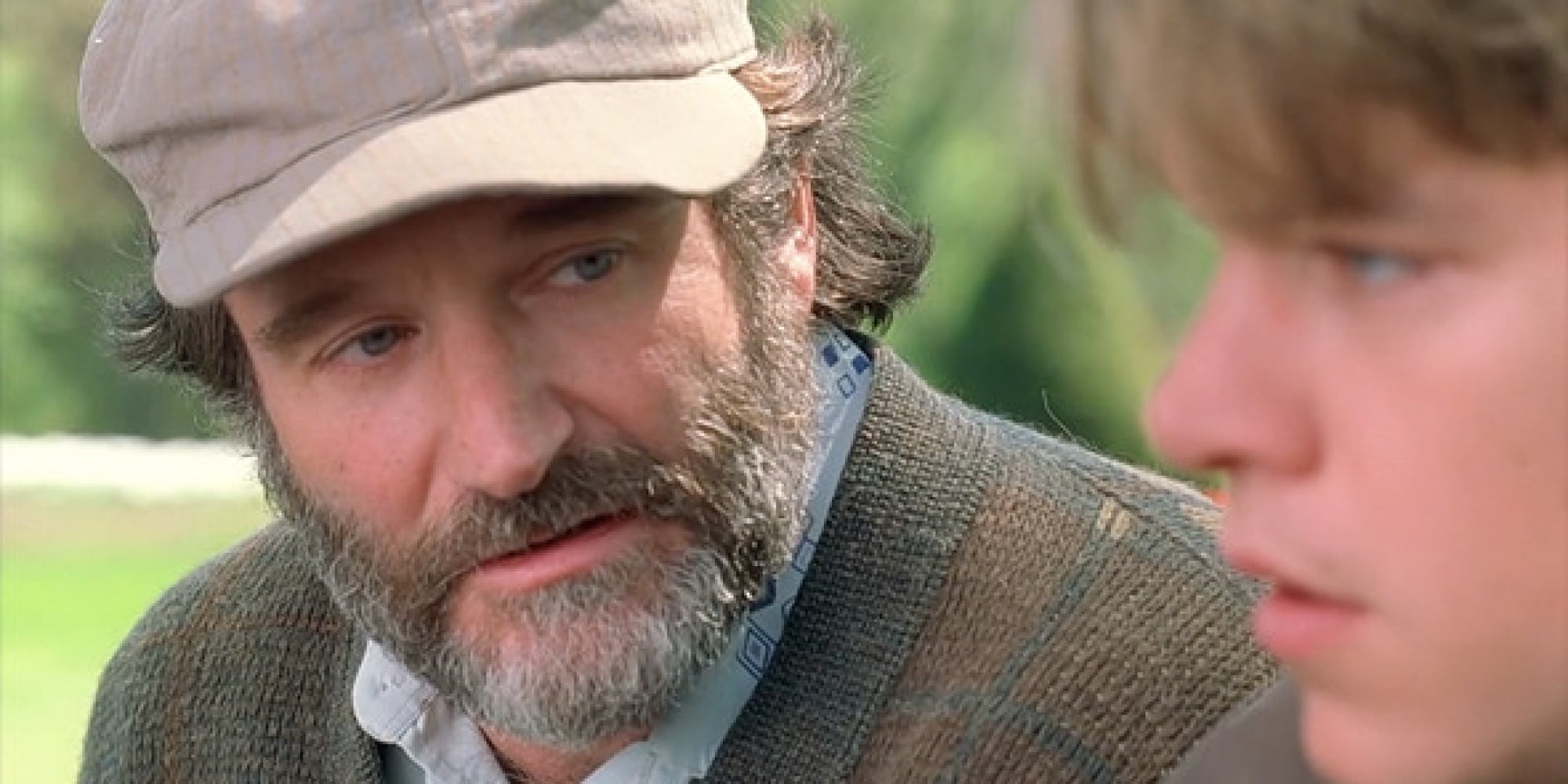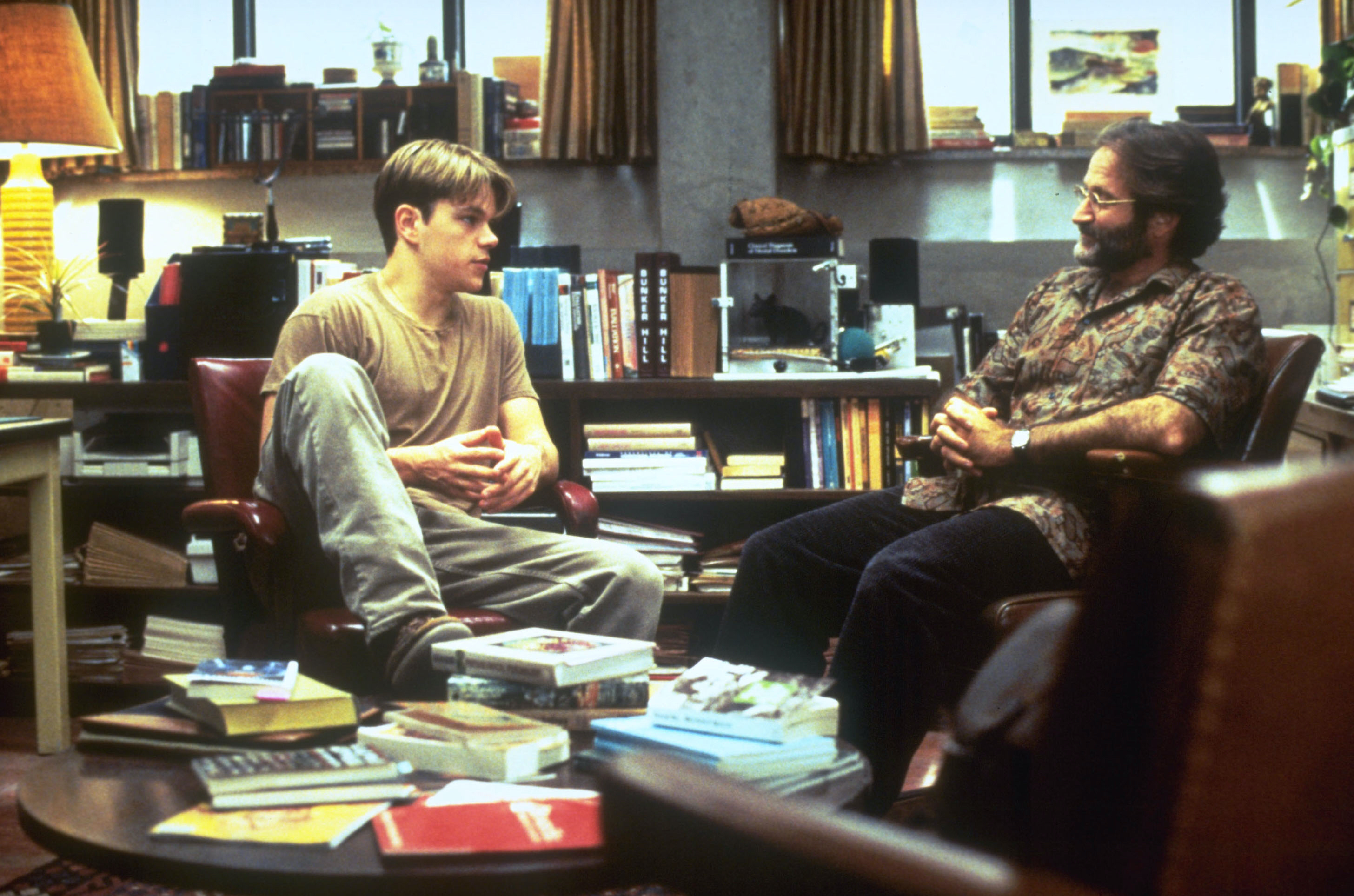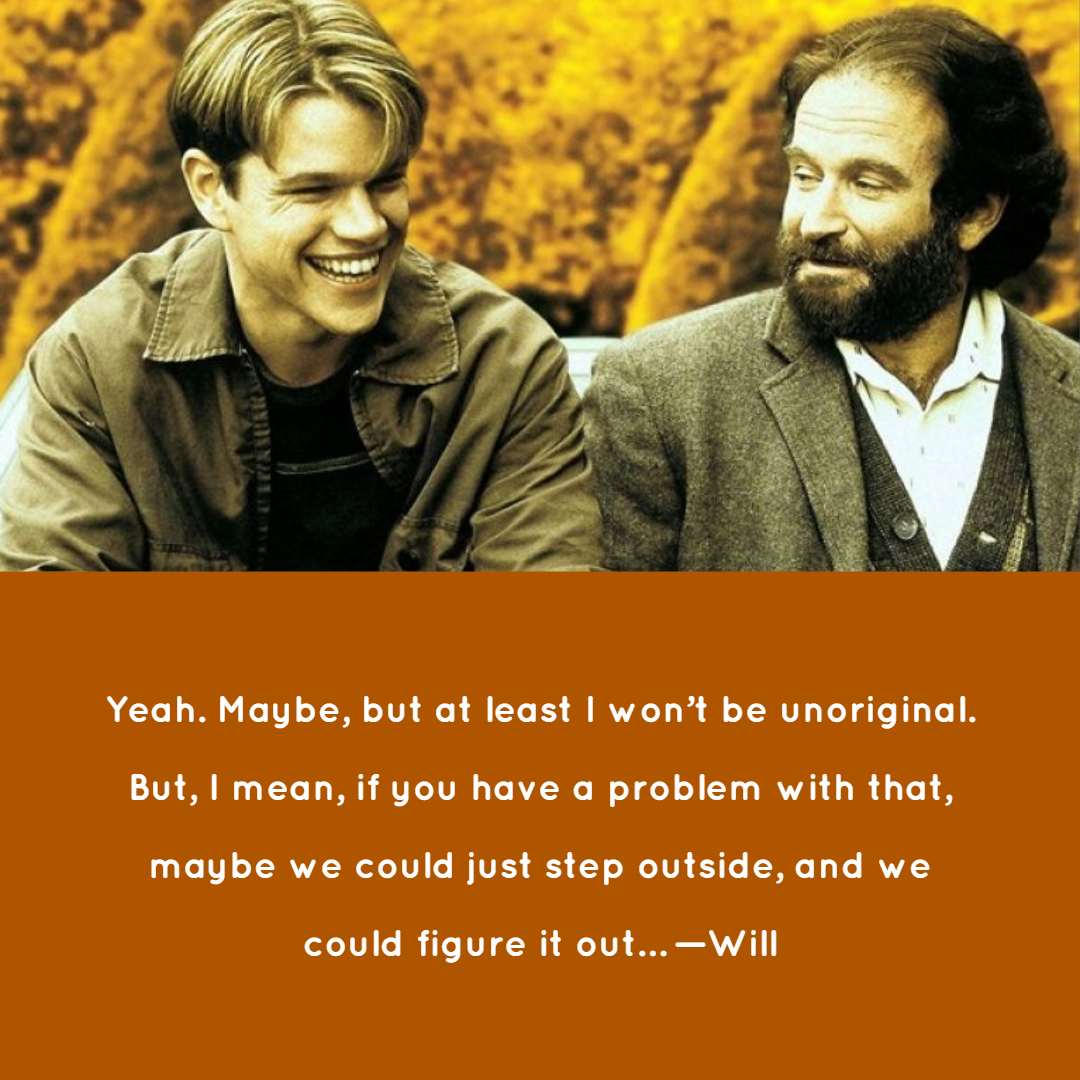Good Will Hunting, a 1997 American drama film, stands as a poignant testament to the complexities of human potential, trauma, and the transformative power of connection. Directed by Gus Van Sant and penned by the brilliant duo Ben Affleck and Matt Damon, this cinematic masterpiece continues to resonate with audiences worldwide, offering profound insights into the human condition. It's a story that challenges perceptions, proving that true genius often lies hidden beneath layers of defense, waiting for the right catalyst to emerge.
At its core, the film delves into the life of Will Hunting, a janitor at MIT whose mathematical genius is inadvertently discovered, setting him on an unexpected path of self-discovery. Far from a simple narrative, Good Will Hunting explores themes of trust, vulnerability, the courage to choose love over fear, and the profound impact of genuine human connection, making it a must-watch for anyone seeking a story with depth and heart.
Table of Contents
- The Enduring Legacy of Good Will Hunting
- Unpacking the Genius: Who is Will Hunting?
- The Guiding Light: Sean Maguire's Compassionate Therapy
- The Stellar Cast Behind the Masterpiece
- More Than Just a Movie: Themes That Resonate
- Critical Acclaim and Lasting Impact
- Where to Experience Good Will Hunting Today
- The Journey of Self-Acceptance: Lessons from Will Hunting
The Enduring Legacy of Good Will Hunting
Released in 1997, Good Will Hunting quickly cemented its place in cinematic history, not just as a box office success, but as a film that sparked conversations about intelligence, emotional healing, and societal expectations. Directed by Gus Van Sant, this drama, with elements of comedy and romance, tells a story that is both deeply personal and universally relatable. It showcased the raw talent of its writers and stars, Matt Damon and Ben Affleck, alongside the masterful performances of Robin Williams, Stellan Skarsgård, and Minnie Driver.
- Sydney Sweeney Husband
- Shannen Doherty Update
- Oscar Best Actress
- Wonder Years Cast
- Matthew Mcconaughey And Woody Harrelson
The film's enduring appeal lies in its authentic portrayal of a troubled genius. Will Hunting isn't a typical protagonist; he's a complex character with a criminal past, yet possesses an innate, genius-level intellect that defies conventional understanding. This juxtaposition of raw brilliance and profound emotional scars is what makes the narrative of Good Will Hunting so compelling and memorable, allowing it to transcend the typical drama genre and touch upon deeper psychological truths.
Unpacking the Genius: Who is Will Hunting?
At the heart of Good Will Hunting is its titular character, Will Hunting. He's a janitor at MIT, a young man from South Boston, whose life seems unremarkable on the surface. Yet, as the film unfolds, we discover he was born with an innate gift: a genius-level intellect, particularly in mathematics. This extraordinary mental capacity allows him to solve complex equations that stump even the most esteemed professors at MIT. However, this brilliance is not a source of joy or ambition for Will; rather, it's a hidden burden, masked by a tough exterior and a penchant for getting into trouble.
The Burden of Brilliance
Will Hunting's genius is not presented as a superpower that solves all his problems. Instead, it's a double-edged sword. His intellect allows him to see through pretenses, understand complex systems, and even manipulate situations to his advantage. However, it also isolates him. He struggles to connect with others on a deeper level, fearing vulnerability and the judgment that comes with revealing his true self. His brilliance, paradoxically, becomes a barrier to genuine human connection, pushing him further into a shell of self-protection.
The film cleverly illustrates that intellect alone cannot bring happiness or fulfillment. Will's mind is a powerful tool, but his emotional landscape is scarred. He can solve the most intricate mathematical problems, but he struggles with the most fundamental human challenge: understanding and accepting himself. This internal conflict is a central theme of Good Will Hunting, demonstrating that true growth extends far beyond academic prowess.
A Past Etched in Trauma
Will Hunting's troubled demeanor and self-sabotaging behavior are deeply rooted in a past filled with trauma and abandonment. His criminal record and his tendency to push people away are not random acts but coping mechanisms developed to protect himself from further hurt. The film subtly reveals the layers of his past, indicating that his genius, while innate, was perhaps also a refuge from a difficult childhood. He uses his intellect to avoid confronting his emotional wounds, building walls around himself that seem impenetrable.
As Bessel Van der Kolk, author of "The Body Keeps the Score," poignantly notes, "the greatest sources of our suffering are the lies we tell ourselves." Will's suffering stems from the lies he believes about himself – that he is unworthy of love, that he must remain isolated to be safe. His journey throughout Good Will Hunting is precisely about dismantling these self-deceptions and confronting the painful truths of his past, a process that requires immense courage and the right kind of support.
The Guiding Light: Sean Maguire's Compassionate Therapy
A pivotal figure in Will Hunting's transformation is Sean Maguire, a compassionate therapist portrayed by the legendary Robin Williams. Sean is not just a therapist; he is a kindred spirit, a man who understands pain and loss, and who sees beyond Will's intellectual facade to the vulnerable human being beneath. Their sessions are not typical therapy; they are profound dialogues, often confrontational, but always rooted in empathy and a genuine desire for Will's well-being. It is through Sean's guidance that Will begins to confront his past trauma and make choices that lead him towards healing and growth.
The Power of Connection
Sean Maguire's approach to therapy is revolutionary for Will. Unlike the other therapists who are intimidated or frustrated by Will's intellect, Sean meets him where he is, using his own life experiences and vulnerabilities to connect with Will. He doesn't try to "fix" Will but rather to understand him. This genuine connection is what ultimately breaks through Will's defenses. Sean teaches Will that true knowledge comes not just from books, but from life experience, from love, and from pain. He shows Will that it's okay to be imperfect, to feel, and to trust.
The relationship between Will and Sean is a masterclass in the power of human connection and mentorship. Sean doesn't just offer advice; he offers himself, his wisdom, and his unwavering belief in Will's capacity for change. This deep bond becomes the secure base from which Will can finally venture out and face his fears, illustrating that even the most brilliant minds need human connection to thrive.
Confronting Inner Truths
One of the most iconic scenes in Good Will Hunting is when Sean repeatedly tells Will, "It's not your fault." This simple phrase, delivered with profound conviction, slowly chips away at the deeply ingrained belief Will holds that he is responsible for the abuse he suffered. This moment is a turning point, allowing Will to finally release years of pent-up pain and self-blame. It highlights the core message that healing begins when we stop telling ourselves lies and start accepting the truth, however painful it may be.
Sean helps Will understand that while he can't change his past, he can choose how he responds to it. He encourages Will to embrace the opportunities before him, to pursue love, and to live a life not dictated by fear. This guidance is crucial for Will to move from a state of arrested development to one of genuine personal growth, proving that even a genius needs help navigating the complexities of their own emotional landscape.
The Stellar Cast Behind the Masterpiece
The success and emotional depth of Good Will Hunting owe much to its exceptional cast, each member bringing a unique dimension to the story. The film stars Robin Williams, Matt Damon, Ben Affleck, Stellan Skarsgård, and Minnie Driver, creating an ensemble that delivers powerful and memorable performances. While the film is a fictional narrative, the impact of its real-life stars, particularly Robin Williams, is undeniable.
Robin Williams' portrayal of Sean Maguire earned him an Academy Award for Best Supporting Actor, a testament to his profound ability to convey empathy, wisdom, and a touch of his signature wit. His performance is often cited as one of his most powerful dramatic roles, showcasing his incredible range beyond comedy. His character serves as the emotional anchor of Good Will Hunting, guiding the protagonist through his darkest moments.
Robin Williams: A Brief Overview of a Legendary Performer
| Attribute | Detail |
|---|---|
| Born | July 21, 1951 |
| Died | August 11, 2014 |
| Notable Role in Good Will Hunting | Sean Maguire (Therapist) |
| Key Achievements (Selected) | Academy Award (Good Will Hunting), Golden Globes, Grammy Awards, Screen Actors Guild Awards |
| Impact | Known for both his comedic genius and profound dramatic performances. His role in Good Will Hunting showcased his ability to portray deep emotional intelligence and empathy. |
Matt Damon's portrayal of Will Hunting is equally compelling, capturing the character's raw intelligence, his deep-seated pain, and his eventual journey towards vulnerability. Ben Affleck, as Will's best friend Chuckie Sullivan, provides grounding and loyalty, showcasing the strength of their bond. Stellan Skarsgård as Professor Gerald Lambeau represents the academic world's struggle to understand Will, while Minnie Driver as Skylar brings a crucial element of romance and a different kind of challenge to Will's emotional walls. The synergy of these actors brought the complex narrative of Good Will Hunting to life, making it a truly unforgettable cinematic experience.
More Than Just a Movie: Themes That Resonate
Good Will Hunting is far more than a simple drama; it's a rich tapestry of universal themes that continue to resonate with audiences decades later. The film masterfully explores:
- The Nature of Genius: It challenges the conventional understanding of genius, showing that it can exist outside academic institutions and often comes with its own set of challenges, particularly emotional ones.
- The Power of Choice: A central theme is Will's ability to choose his own path. As the film implies, unlike an autistic character who "cannot and does not change" (referencing a comparison to "Rain Man"), Will Hunting is a genius who "can change, and grow, if he chooses to." This emphasis on agency is powerful.
- Trust and Vulnerability: Will's journey is fundamentally about learning to trust others and, more importantly, to be vulnerable. His breakthrough moments come when he allows himself to open up to Sean and Skylar.
- Healing from Trauma: The film provides a sensitive portrayal of how past trauma can dictate present behavior and the arduous, yet necessary, process of confronting those wounds for true healing to begin.
- Love and Connection: Both romantic love (with Skylar) and platonic love/mentorship (with Sean and his friends) are depicted as essential catalysts for Will's growth, demonstrating that human connection is vital for well-being.
- Social Class and Opportunity: The film subtly touches upon the divide between Will's working-class background and the elite academic world of MIT, exploring how talent can be overlooked or mismanaged due to societal barriers.
These themes, woven together through compelling dialogue and powerful performances, elevate Good Will Hunting beyond mere entertainment, making it a film that prompts introspection and discussion about what truly constitutes a meaningful life.
Critical Acclaim and Lasting Impact
Upon its release, Good Will Hunting was met with widespread critical acclaim. It garnered numerous awards and nominations, including nine Academy Award nominations, winning two: Best Supporting Actor for Robin Williams and Best Original Screenplay for Ben Affleck and Matt Damon. Its Rotten Tomatoes score reflects strong critic and audience approval, staying updated with positive reviews even years later. The film's commercial success further solidified its status as a cultural phenomenon.
Beyond the accolades, the lasting impact of Good Will Hunting is evident in its continued relevance in popular culture and academic discussions. It's frequently cited in discussions about mental health, the complexities of genius, and the importance of mentorship. The film's memorable lines and emotional moments have become ingrained in collective memory, ensuring that the story of Will Hunting continues to inspire and challenge new generations of viewers.
Where to Experience Good Will Hunting Today
For those wishing to revisit this classic or experience it for the first time, Good Will Hunting remains widely accessible. You can stream Good Will Hunting for free on platforms like Pluto TV, Hoopla, and Kanopy. Additionally, the film is available for purchase or rent on various digital platforms, offering convenient options for viewing:
- Streaming (Free): Pluto TV, Hoopla, Kanopy
- Purchase/Rent (Digital): Amazon Video, Apple TV, Fandango at Home, Microsoft Store, Spectrum on Demand
Whether you prefer to stream it for free or own a digital copy, the emotional journey of Will Hunting is readily available, allowing audiences to discover or rediscover the depth and brilliance of this 1997 film directed by Gus Van Sant, starring Robin Williams, Matt Damon, and Ben Affleck.
The Journey of Self-Acceptance: Lessons from Will Hunting
Good Will Hunting offers invaluable lessons that extend far beyond the silver screen. It teaches us that true genius isn't just about intellect; it's about emotional intelligence, the courage to confront one's past, and the willingness to embrace vulnerability. Will Hunting's transformation from a troubled, defensive young man to someone who chooses love and a future filled with possibility is a powerful reminder that healing is possible, even for the most deeply wounded.
The film underscores the importance of finding a "Sean Maguire" in your life – someone who sees your potential, challenges your self-limiting beliefs, and provides unconditional support. It also emphasizes the critical role of self-acceptance. As Will learns, the greatest barrier to happiness often lies within ourselves, in the "lies we tell ourselves" about our worth and capabilities. By choosing to confront these internal narratives, we open ourselves up to growth, connection, and a life truly lived.
What aspects of Will Hunting's journey resonated most with you? Share your thoughts in the comments below, or consider exploring other articles on our site that delve into the psychology of film and personal growth. Your journey of self-discovery, much like Will's, is a unique and valuable one.


